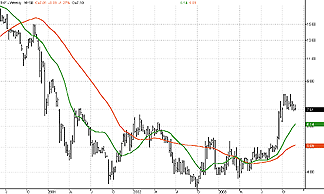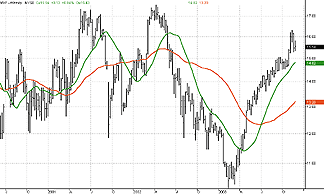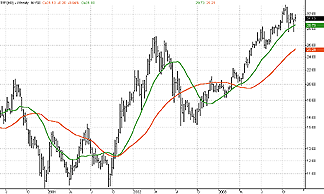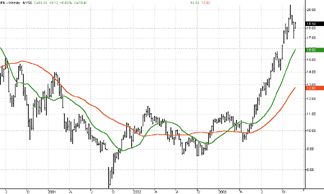TURKISH INVESTMENT FUND (TKF)

The Turkish Investment Fund (TKF) is a closed-end fund under the advisement of Morgan Stanley Investment Advisors. Traded on the New York Stock Exchange (NYSE), the fund is geared toward providing investors with exposure to equities of companies based in or out of Turkey. Founded in December 1989, the fund had total net assets in excess of $29 million as of this writing. Holdings in the Turkish Investment Fund include companies such as Turkiye Is Bankasi (banking), Akbank (banking), and Turkcell Iletisim Hizmet (communications). By industry sector, TKF is diversified principally among financials, consumer discretionary, and industrials.
TKF has been tracing a consolidation pattern between $8 and about $3.75 since spring 2001, after having lost more than half its value in the closing months of 2000. While there have been minor rallies in the Turkish Investment Fund late in 2001, late in 2002, and late in 2003, the fund has yet to enjoy an enduring bull market over the past few years.
What they say: "On the economic front, an unpopular stabilization programme backed by a $17.5 bn loan from the International Monetary Fund has begun to yield dividends. Inflation this year is set to fall to a 27-year low of 20 percent, from 30 percent last year. The government is vowing to stick to tight fiscal and monetary policies to drive inflation down to 12 percent next year, and to a single digit thereafter, in line with the EU's economic criteria for membership." -- Leyla Boulton, "Swathe of reforms wins international approval," Financial Times, November 17, 2003.
MEXICO FUND (MXF)

The Mexico Fund (MXF) is a closed-end fund under the advisement of Impulsora del Fondo Mexico, SA de CV. Traded on the NYSE, the fund is geared toward providing investors with exposure to the equities of companies based in or out of Mexico. In operation since June 1981, the Mexico Fund had total net assets of approximately $240 million as of this writing. The fund is diversified by sector into industries such as communications, food and beverage, cement, retail, and housing, and includes companies such as TELMEX and AMX (communications), and WALMEX (retail).
MXF has been rallying strongly in 2003 after losing approximately half of its value over the course of 2002. Having retraced approximately 50% of its 2002 decline, the Mexico Fund is -- since early summer 2003 -- above both its 20- and 50-day moving averages.
What they say: "The blossoming debt market is the result of Mexico's hard-fought economic stability. In the past few years, inflation and interest rates have fallen to international levels, allowing investors to better gauge the future value of money. The country, under President Vicente Fox, has been criticized for not carrying out economic overhauls that might help it compete with the likes of China, which overtook Mexico this year as the No. 2 exporter to the US market. But progress in areas such as the local lending market highlights the less apparent benefits of stability, with or without further change." - David Luhnow, "Mexico's New Lender: Mexico," The Wall Street Journal. November 13, 2003.
TEMPLETON RUSSIA AND EAST EUROPEAN FUND (TRF)

The Templeton Russia and East European Fund (TRF) is a closed-end fund under the advisement of Templeton Investment Management. Traded on the New York Stock Exchange, the fund is geared toward providing investors with exposure to equities of companies based in or out of Russia and East Europe, including former Soviet bloc nations. Beginning in June 1995, the Templeton Russia and East European Fund had nearly $119 million in total net assets as of this writing. Holdings in the fund include Sberbank RF (banking/finance), Surgutneftegaz (oil and gas), and Yukos (oil). Industry representation includes sector plays in energy, telecommunications, financials, and utilities.
TRF has been in a strong bull market since late summer 2002 when prices for the fund bottomed in the wake of the correction from summer 2001 to spring 2002 bull market in Russian and East European stocks. Rising above its 20- and 50-day moving averages in late spring 2003, the fund set a 41/2 year high in mid-October.
What they say: "Mr. Putin may not be too concerned that his actions raise profound questions about his commitment to the rule of law, human rights and democracy. But he should remember that the assault on Mr. Khodorkovsky could undermine something he does hold dear -- Russia's economic development. Aside from the direct damage to Yukos, Mr. Khodorkovsky's company, the biggest economic impact of the investigation could be on the approach of state officials to business in general. Entrepreneurs across Russia fear bureaucrats could now launch probes of their own against other companies, big and small." -- "Putin's problem," Financial Times, November 13, 2003.
INDIA FUND (IFN)

The India Fund (IFN) is a closed-end fund under the advisement of Advantage Advisors and was founded in February 1994. With over $390 million in total net assets, the fund is traded on the NYSE and is geared toward providing investors with exposure to the equities market of India. Top sectors represented in the fund include energy, finance, consumer nondurables, computer software and programming, and pharmaceuticals. The fund's largest positions are in companies such as Reliance Industries (diversified manufacturing), Infosys Technologies (information technology), and Hindustan Lever (manufacturing/consumer goods) as of this writing.
IFN has been in a descending consolidation since early in 2001 and has traded above and below its flattening 20- and 50-day moving averages. At the same time, prices for IFN have risen dramatically since spring 2003, doubling from the April lows (when IFN finally broke out above its 20- and 50-day moving averages) to the October highs.
What they say: "Foreign investors are charmed by India these days, and no wonder. The government is stable, domestic consumption is strong and inflation is in check. Since May foreign institutional investors have pumped $2.6 billion into Indian equities -- more than three times the inflow in the whole of 2002, according to the Securities and Exchange Board of India (Sebi), the market regulator. The stockmarket has risen by 51%." -- "Unwelcome guests: Hedge funds in India," The Economist, October 4, 2003.
Charts by TradeStation
Originally published in the April 2004 issue of Technical Analysis of STOCKS & COMMODITIES magazine. All rights reserved. © Copyright 2004, Technical Analysis, Inc.
Return to April 2004 Contents